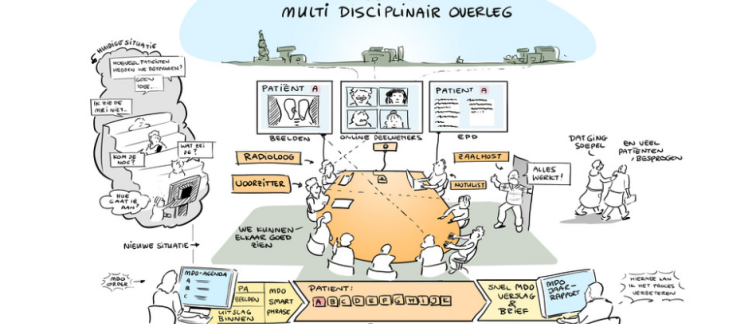Tools for optimizing MDT
Within Amsterdam UMC there are 50 to 100 MDTs per month, with an increasing demand for regional and national MDT's. The need of improvement of the MDT's led to the start of the project Towards a Future-proof MDT in 2021, which was initiated by the innovation and digitization program Samen Digitaal2 and the Training and Assessment of Medical Care Professionals (TeAMZ3) program.
Stephanie van der Burgt, APH researcher and project leader: “This project started from a problem indication from practice. As trainers of the TeAMZ program specializing in MDT, our aim was to craft a comprehensive training curriculum that addressed pertinent aspects observed in practice. Additionally, we sought deeper insights into the underlying mechanisms, given the scarcity of research on MDT within healthcare. We were driven by the conviction that our efforts could positively impact healthcare professionals."
Being part of an innovation grant from Amsterdam UMC, the impact of the project was one of the important aspects to think about. However, the actual impact occurred much later, after the first results of research came in and we were able to develop and launch the MDO-Kompas platform. The platform's purpose is to maintain and enhance the quality and efficiency of MDT in the dynamic and digitalized medical context. It contains relevant information and support to optimize and digitalize MDT.
Rollout locally and regionally
The visibility that arose from the MDO-Kompas platform kickstarted even more growth opportunities for this project. To support optimization of local and regional MDOs, we developed customized training, data-driven learning, research and collaboration among various hospitals and departments.
Van der Burgt: "The project initially involved only three individuals, but it has since evolved into an MDT research consortium comprising eight members. This consortium collaborates with interns, healthcare professionals, the IT and facilities departments, and Samen Digitaal, the Amsterdam UMC digitization program. The outcome has exceeded expectations: our collaboration with colleagues from Samen Digitaal led to the drafting of an advisory report on MDT, invitations to present our findings at symposia, and involvement in the development of new MDT rooms within Amsterdam UMC. Moreover, this visibility has had a positive impact on the TeAMZ program, with an increasing number of medical centers expressing interest in MDT training opportunities for their departments. These results not only influence MDT practices within Amsterdam UMC but also extend to other hospitals."
Factors contributing to impact
Besides creating a visible platform, another important factor that created impact was the setup of a project group in which all experts and stakeholders on different topics were involved. Van der Burgt: “At the outset, some stakeholders hesitated to join the project group. However, as we refined our narrative to articulate the project's goals and its imperative in addressing pertinent healthcare challenges, stakeholders became increasingly enthusiastic. The widespread discussion and urgency surrounding MDTs in healthcare practice also played a significant role in garnering support. Additionally, the in-house innovation grant provided invaluable assistance in propelling the project forward."
Encountered challenges
The project team faced some difficulties. Healthcare professionals are exceptionally busy people, which challenged the team in staying connected. The only solution to this problem is to keep reaching out to the stakeholders and experts and to have patience regarding responses and actions. Additionally, optimizing all conditions, both technical and non-technical, for MDTs is more complex than expected. There is no blueprint yet of what these conditions optimally look like.Van der Burgt: “Fortunately, engaging stakeholders from the project's inception proved beneficial. Collaborating with them, discussing various aspects, and seeking their input proved invaluable. Additionally, having the opportunity to hire a project and research assistant and involve interns in bachelor's and master's theses greatly facilitated our ability to explore different optimization avenues in greater depth.
What is your most important advice to other researchers?
“Do not let people talk you out of believing in the potential of your project and the impact it can have. Even if it requires more effort than you originally anticipated and necessitates acquiring new skills. Remember to keep your stakeholders and all people involved in your project up to date, stay in close communication with them, and celebrate milestones all together.”
Do’s:
- Involve stakeholders from practice or your target population from the start, even during the brainstorm phase.
- Start from an actual need or question identified from practice or your target population ensuring that the outcomes are applicable and relevant to practice.
- Seize the (unexpected) opportunities that come along the way, their potential benefits may become evident later on.
Don’ts:
- Do not just start your research without thinking about the potential impact it can have, anticipate and work towards that.
- Do not try to do this on your own! From the start, carefully consider the right individuals to involve.
- Do not forget to invest in other outcomes than scientific papers or an implementation in practice. You will also need other pieces of outcome (think about reports or posters or presentations, or a visual aid (in Dutch: praatplaat).
MDO = Multidisciplinair overleg
Program Samen Digitaal: The program "Samen Digitaal" was initiated to give practical substance to this strategy of chain collaboration and delivering care in a virtual manner. Samen Digitaal (tulpintranet.nl)
TeAMZ program: Training and Assessment for Medical Care Professionals; the training program on collaboration for medical care professionals. This unique training program focuses on strengthening multidisciplinary and interprofessional collaboration.
Amsterdam UMC, Locatie VUmc - Teamz

